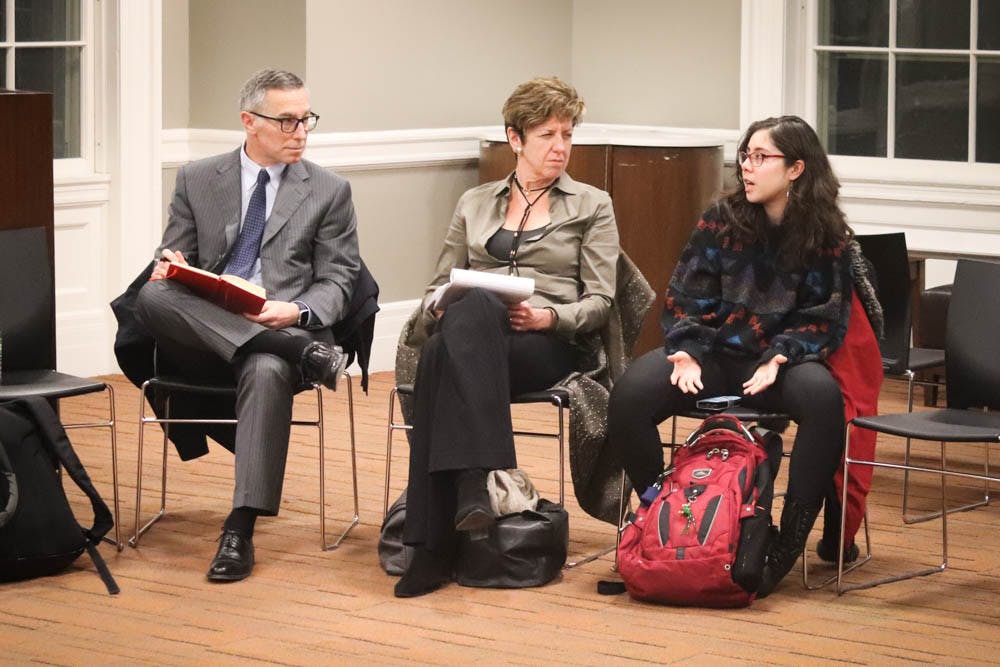Provost Richard Locke P’18 and Chief of Staff to the Provost Marisa Quinn listened to student feedback about unexpected costs that students encounter while attending Brown at the Undergraduate Council of Students’ general body meeting Wednesday evening.
Members of the general body brought up homework paywalls and participation in off-campus club events as examples of expenses that are not included in the University’s reported cost of attendance.
“I think we’re interested in … trying to understand what are really the big issues so that way we can actually develop plans to address (them),” Locke said.
For courses that require MindTap, a digital service that links course textbooks to homework submissions, students are forced to pay for books at full cost, said Jason Carroll ’21, who used MindTap in a course last semester.
“There’s no way to really seek renting something or buying something used, you pretty much have to buy the full price textbook,” Carroll said. “There was no way around, it was just a fixed cost.”
Limitations of the Undergraduate Finance Board can make it difficult for low-income students to participate in activities such as off-campus conferences with their clubs, said William Zhou ’20, chair of the student activities committee.
Under current UFB regulations, “we can fund up to five people, but if there are … six high-need students, we have no way to fund the additional sixth person,” Zhou said.
The students in attendance at the meeting suggested ways that the University could reduce some of these costs, including covering printing costs above the $30 students that automatically receive through PAWPrints at the start of each year.
“If it’s required coursework or readings, maybe the cost could somehow be covered … or the professor (could) take charge of giving copies to students,” Zhou said, adding that the quantity of required printing for certain courses “can bite at your printing money really quickly.”
Locke mentioned food security as another financial issue he wants to address.
“I think it’s really, really important that everyone on campus have security in food, … so that’s something that we’re looking at — how do we make it affordable,” he said.
To accommodate students who arrive in residence halls before classes commence, some students suggested that the University should have at least one eating option available on campus whenever dorms are open. Currently, residence halls open days before dining facilities do, as they did at the start of the spring 2018 semester.
“Dining halls don’t open until the night before (classes start), and I know some students who just didn’t eat for the entire day until dinner because they would have to go off-campus to get food,” said Mar Weiss ’20, chair of academic affairs.
In response to suggestions about how to provide additional funding to support incoming students as they transition to college, Locke said that the University would seek to address this issue.
“We’re trying to figure out what we can do so that the transition is smoother than it is sometimes for many people,” he mentioned.
It can also be difficult for low-income students to have access to all employment opportunities on campus, students at the meeting said, such as undergraduate teaching assistant positions.
Some professors expect their TAs to work more than the maximum number of hours for which they can be paid, Carroll said. “I feel like that really creates a barrier for low- and even middle-income students because you’re essentially signing up to work and not get paid … and it’s not really accessible for people who can’t afford to work for free.”
Locke expressed disapproval of this practice, and referenced the work of the task force led by Dean of Financial Aid Jim Tilton as potentially useful for resolving similar issues. The task force recommended changes to student employment practices at last month’s Brown University Community Council meeting, The Herald previously reported .
“You want to make sure that whatever you’re doing is … actually giving you some skills, and you can get those skills in the cafeteria sometimes, in terms of customer relations (or) project management, and you can get them in the classroom or the lab,” Locke said. “We just want to make sure everyone has access to those (opportunities).”
The general body did not vote on proposed amendments to the Campus of Consent Bill, which they have discussed at two meetings earlier this semester. The group did not set a date for the vote.

ADVERTISEMENT




